“STOLEN” is a year-long NBC 7 investigation into the sex trafficking and exploitation of children in San Diego County. The seven-episode documentary series is told from the perspective of survivors, advocates -- even traffickers, and sex buyers, explaining the depth and scope of this problem in our communities and our schools. And with more children online during the coronavirus pandemic, experts say they are at greater risk of exploitation now more than ever. “STOLEN” celebrates the strength of survivors and their families, as they struggle to free themselves from the bonds of sex trafficking. See the full series here.
As the fog burned off on a San Diego morning in April 2016, Christine Penwell, an investigator with the San Diego County District Attorney's office, buzzed the intercom at a high-rise condo overlooking Balboa Park.
Ronald Posner, a wealthy, 74-year-old executive, answered the call and let her in. Outside of his door, Penwell started recording what followed.
What brought Penwell to Posner’s door that morning were two teenage victims in a sex trafficking investigation.
Penwell would later testify that in the weeks leading up to her meeting with Posner, she had listened to a series of recorded phone calls made from the San Diego Central Jail, conversations between an inmate and the two girls, ages 15 and 16, who said Posner had paid them for sex on several occasions. One of the teens would later claim those illegal acts had been going on for more than eight months.
“Come in, sit down,” Posner told Penwell and her partner.
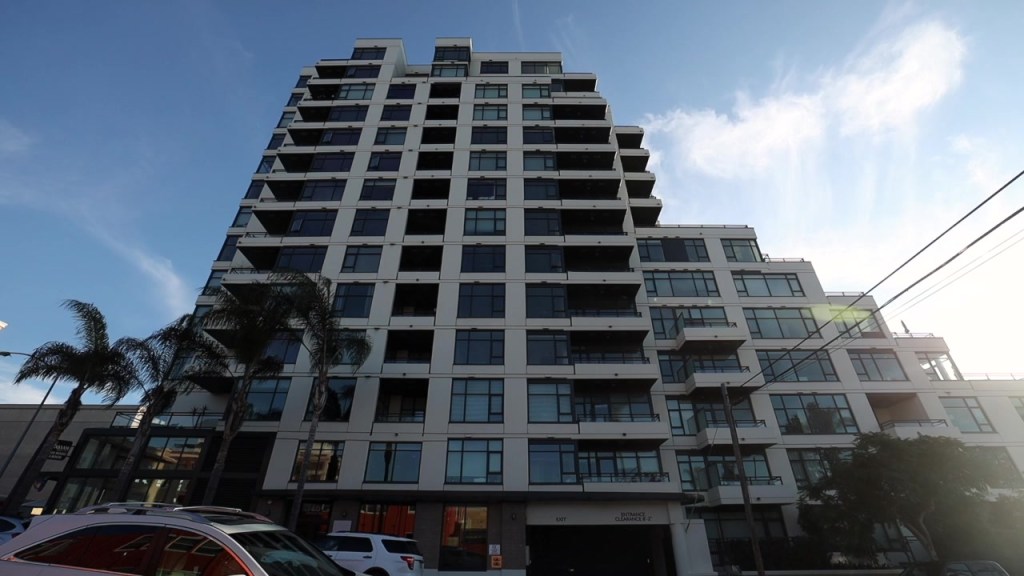
After exchanging pleasantries, admiring the skyline view from his ninth-floor patio, and hearing a brief history of Posner’s lucrative career, Penwell cut to the chase.
“Let me start off by saying that, by no means are you under arrest or are you compelled, you know, to talk to us,” Penwell can be heard saying in a recording of the conversation obtained by NBC 7 Investigates. “The individual I’m investigating is a pimp… during my investigation, I’ve come across your name from his lips.”
What drew the attention of the DA’s office was that one of the teens paid $500 to bail the 19-year-old inmate, James Edward Gary, out of jail, and investigators believed he was the girls’ pimp. The 15-year-old girl also told Gary she got the $500 from Posner for having sex with him.
“From my understanding, these women you have hired, per se, to be companions of yours?” Penwell asked.
“Not really, but go on,” Posner replied.
“Listen, most of the questions I’m asking you, I already know the answers to,” Penwell explained, quickly rebuffing Posner’s denial. “It’s not a secret that you enjoy the company of young, Black females and so, that’s why I’m here. If you could be a little bit more honest with me in regards to your relationships with these two gals, that would help out my investigation a great deal.”
“Ok,” Posner replied. “What would you like to know?”
In the remainder of that 17-minute interview, Posner admitted to having sex with both teens but said they had told him they were 18 and 19-years old. He said he paid them $50 to $100 for each visit. (Though, the exact amount he paid each girl was later determined to be much more.)
Two weeks after Posner’s meeting with investigators, Gary was arrested and charged by the DA’s office with two felony counts of human trafficking of a minor. In late 2016, a jury convicted Gary on those charges, and a judge sentenced him to ten years in state prison.
But Posner was never charged, nor was he even a focus of that investigation. There is no indication that Posner was investigated beyond that one recorded conversation he had with DA investigators.
In fact, the DA’s office gave Posner immunity from prosecution in exchange for his testimony against Gary even though at least one victim tried to tell investigators Posner might have sexually exploited other teen girls, according to an interview later given by that teen victim to a private investigator.
It’s a case that Gary’s defense attorney, Patrick Dudley, says highlights racial inequities in the justice system.
“You know, rarely do you see a situation where the dichotomy is so clear,” Dudley told NBC 7. “Where a young African-American male ends up spending 10-plus years in prison, and the wealthy, white male gets immunity and gets to walk off scot-free.”
The DA’s explanation of Posner’s immunity deal highlights what critics say is another problem with our justice system: oftentimes, sex buyers -- even those whose victims are teens, or younger -- face little to no punishment.
“It’s disturbing,” Dudley said.
THE HUMAN TRAFFICKING INVESTIGATION
“I was really the victim in all of this,” Posner told NBC 7 by phone in November 2019. “From the phone calls, from [James] Gary, they came after me. I didn’t go after them.”
Posner claims he was the target of an elaborate scheme, orchestrated by the 19-year-old pimp who pulled strings from behind bars.
In a podcast episode of "Into San Diego," Monica Dean and Tom Jones go into their investigation of the James Gary / Ronald Posner case. Listen to their findings below.
NBC 7 Investigates reconstructed what happened from the beginning of this case by reviewing dozens of legal filings tied to it and interviewing those who were involved. It started when James Gary was arrested on an assault charge, on January 23, 2016. Gary was already on probation, so the new criminal charge could add to his sentence if convicted. In his first phone call from jail, Gary sounded desperate.
You’ve gotta get me out of here.
James Gary told the 15-year-old girl over the phone.
Gary made 51 more phone calls from jail in the following 12 days. A majority of those calls went to two teenage girls, ages 15 and 16. (To protect the privacy of the two teenage trafficking victims in this case, NBC 7 is identifying the girls only by their ages.)
Those recordings were evidence in his trial and were obtained by NBC 7 after a formal request for production to a superior court judge was granted.
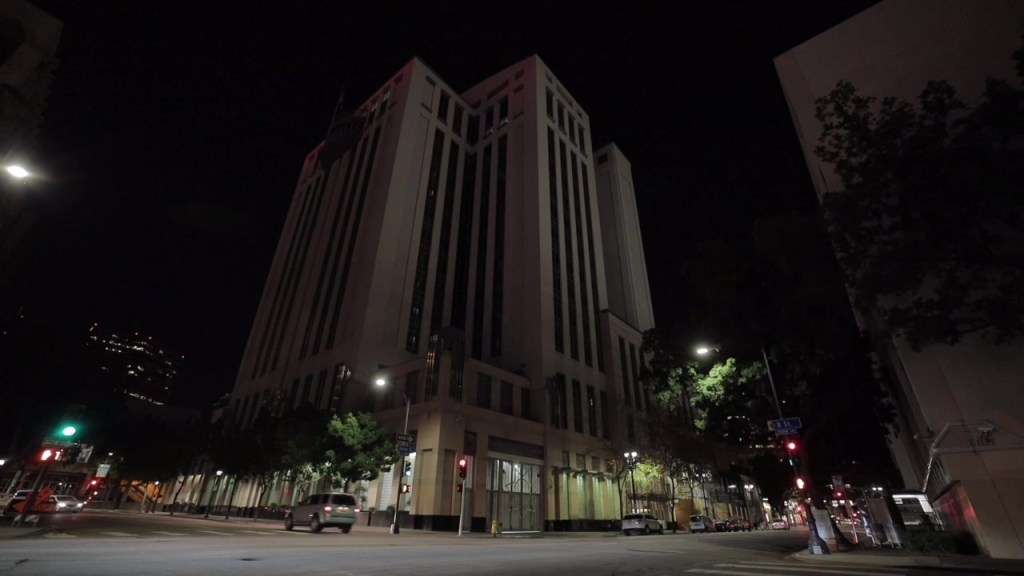
In that first phone call he made from jail, Gary said he knew of a wealthy sex buyer that could deliver the $500 he needed to bail out of jail.
“His name is Ron, and his last name is P-o-s-n-e-r,” Gary told the 15-year-old teen. “He’s the CEO of something.”
Gary apparently knew about Posner because the other teenage girl he was talking to from jail, the 16-year-old, had allegedly been having sex with Posner for money for months, according to the teen’s testimony and sworn declarations.
In subsequent phone calls, Gary begged both girls to try and get money from Posner, as well as other sex buyers they could find online. He gave the 15-year-old detailed instructions on how to entice Posner with messages and pictures on social media.
“Keep it professional...don’t sound young...trust me, he likes girls that look like you,” Gary told her.
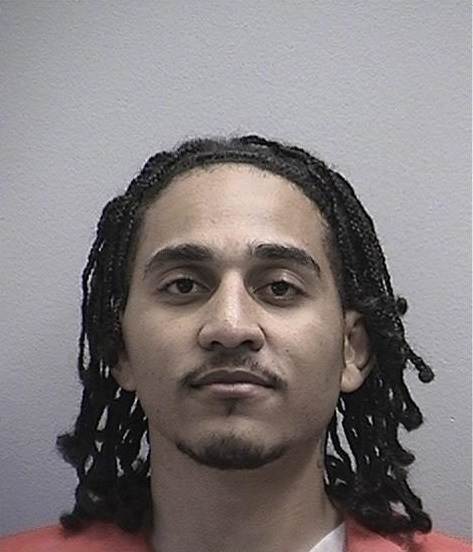
“But he’s old, he’s really old,” the girl replied. Twelve days after his arrest, Gary got good news in a phone call with the 15-year-old girl: his plan with Posner had worked.
“I’m going to bail you out today,” the 15-year-old told Gary. “Cuz’ Ron, he’s giving me the money.”
WHO IS RONALD POSNER?
“I feel it was entrapment, or close to entrapment,” Posner told NBC 7. “If you listen to the jailhouse recordings, they were targeting me. And yes, I fell for it to a certain degree.”
Emails to Ronald S. Posner from NBC 7 seeking his side of the story were quickly returned by the now 78-year-old technology and business entrepreneur, who agreed to two recorded phone interviews.

Posner is a Harvard business school grad whose career blossomed in 1989 when he took over for Peter Norton, founder of the company Norton Computing.
Posner’s role helped orchestrate Norton’s merger with the international security corporation Symantec, creating a software giant that soon became a household name: “Norton Antivirus.”
Corporate news releases touted the merger as one of Posner’s “career home runs.”
Posner is currently the Chairman and CEO of eChinaCash, a prepaid credit company that, according to its website, services the Chinese oil industry.
Public documents confirm Posner has also had a stake in a wide variety of other businesses.
Posner was an “angel investor” in the popular dating website Match [dot] com, according to his eChinaCash company profile. He was also on the board of an Israeli-based company called Puresight, which according to online advertisements, designed software that helps parents protect their children from cyberbullies and online predators.
Posner’s business endeavors were brought up in his April 2016 interview with investigators.
I think what’s happening here is that you’re kind of a ‘lucrative fish,’ for them to use...
District Attorney Investigator Christine Penwell to Ronald Posner
Recorded interview on April 4, 2016
Posner says his CEO-status and wealthy reputation made him a target of Gary and the two teenage girls. D.A. Investigator Penwell acknowledged as much in her first interview with Posner.
“I think what’s happening here is that you’re kind of a ‘lucrative fish,’ for them to use,” Penwell said in the recorded interview. “It could probably be a mutual thing between both of you. Meaning that obviously you get their company and they get your cash.”
Posner agreed with that characterization.
When asked, Posner told Penwell he only had sex once with each girl. When NBC 7 asked Posner if he had sex with the teen girls in 2016, he replied, “a little bit, eventually.”
But when Penwell asked Posner how old he thought the girls were, he said the girls told him they were 18 and 19-years-old.
“[The 16-year-old] said she was 19 when we met, but I obviously found out later that she was much younger,” Posner told NBC 7.
But the 16-year-old contradicted Posner. In an interview with a private investigator for Gary’s defense team, provided to NBC 7, the teen said, “He never asked my age, but I later told him (Posner) that I was sixteen. Ron told me that he didn’t care if I didn’t care, and we continued to see each other.”
Posner told NBC 7 he didn’t know the girls were underage at the time they had sex; that he didn’t “really know anything about them.”
But the answer Posner gave Penwell about the girls’ ages apparently played a pivotal role in the prosecution’s decision to offer him immunity from criminal charges, in return for his testimony against Gary. And that decision remains a source of intense frustration for Gary’s defense attorney.
“Here’s a 74-year-old man who had sex with minors, who had success in corporate America, he got a ‘get out of jail free’ card,” attorney Patrick Dudley told NBC 7.
THE STATE OF CALIFORNIA V. JAMES E. GARY
Prosecutors then charged James Gary with two felony counts of human trafficking of a minor, based solely on his phone conversations from jail with the two teenage girls.
Posner and the 15-year-old girl then testified against Gary, at his preliminary hearing in June 2016.
A transcript of the hearing obtained by NBC 7 reveals new details.
When Posner entered the courtroom, prosecutor Martin Doyle gave him a letter that granted him immunity from criminal prosecution and specifically shielded him from the consequences of what he would admit to on the witness stand, and other alleged crimes revealed by the 15-year-old girl's testimony.
To read that immunity offer letter from the DA’s office, click here or look below.
At the preliminary hearing, the 15-year-old testified she met Gary at a San Diego trolley station and that messaging on Facebook led to a romantic relationship. But she also testified she’d had sex with people for money long before she met Gary. She confirmed that she posted her photo online, where she solicited men for money to buy “clothes...shoes, food, and games.”
“I was working on my own,” the teen testified.
In the jailhouse calls obtained by NBC 7, Gary can be heard coaching the teen on how to solicit sex buyers online, including what to write; what to say; what to look like in photos; and how to screen for callers who would pay for sex.
On the stand, the teen said Gary had no influence over her decisions, that they were all made on her own, and that she would only give the money she earned to Gary if he needed something.
“When you would go have sex with someone, [James] Gary was not requiring you to give him any portion of that...correct?” Gary’s defense attorney Dudley asked. “Correct,” the teen answered, also confirming that Gary “was not collecting a commission” on her work.
The teen said her contact with Posner also was made completely on her own, contrary to what is heard in the recorded phone calls with Gary from jail. The teen testified she told Posner she was 18, had sex with him, and he paid her afterward.
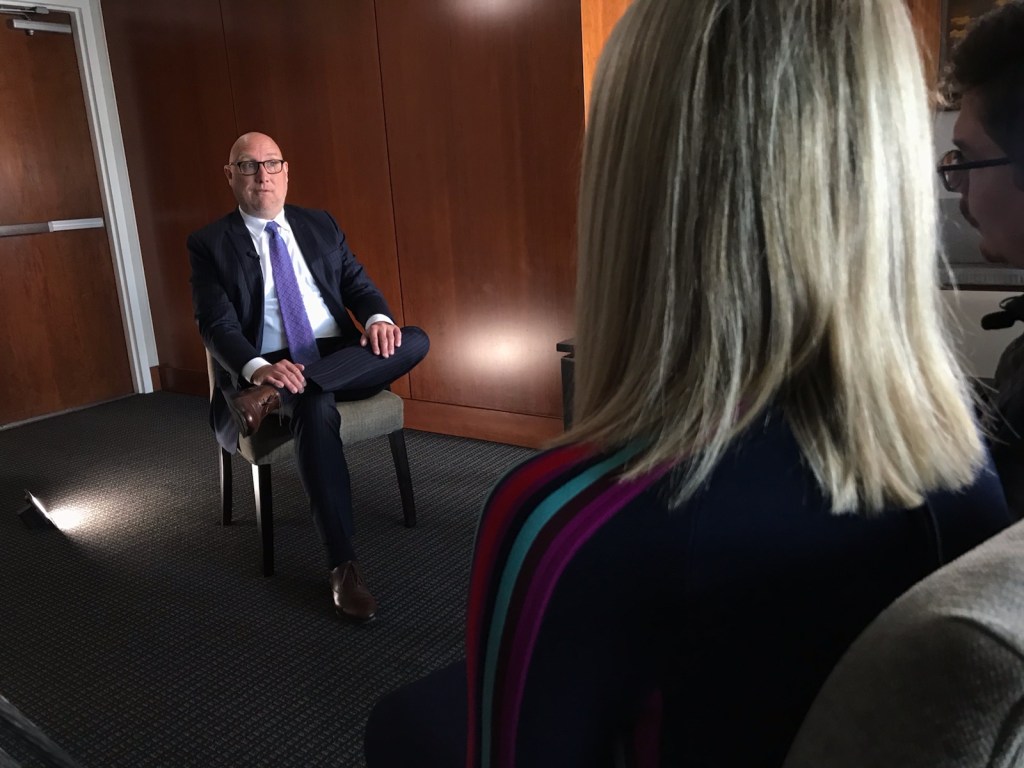
Next on the stand was Posner, who was reminded by prosecutors he had immunity from his crimes so long as he didn’t lie on the stand.
“Did the two of you ever have sexual relations?” prosecutor Doyle asked, referring to the 15-year-old girl.
“Yes...two to three times,” Posner replied, saying he paid her an amount of money between $500 and $600.
Posner also admitted to having sex “a few times” with the 16-year-old that Gary had been calling from jail but added that both girls told him they were 18 and 19-years-old.
“Have you provided money for sex with any other women, besides those two women? In the last two years?” Dudley asked, in his cross-examination.
“Probably in my life, yes,” Posner answered. “Maybe one or two.”
Later in his cross-examination, Posner inferred he may have had sex with more than “one or two” women.
In regards to “having sex with young African-American females, other than the two I’ve already mentioned, have you paid any other ones in your life for that?” Dudley asked.
“Yes.”
“On one occasion? More than one occasion?”
“Probably more than one.”
“More than five?”
“Maybe five-five or six,” Posner said, adding that these encounters occurred in San Diego.
Looking back on the proceedings, Posner told NBC 7 “I tried to be truthful with the answers I gave.”
Read the transcript from the Preliminary Hearing here.
Months after the preliminary hearing, the 16-year-old teen told a private investigator hired by Gary’s defense team that there were other young girls that Posner was sleeping with in exchange for money and gifts.
“Ron [Posner] has a lot of girls that he sees, mostly young African-American girls, between fifteen and twenty-six years-old,” she said, according to a transcript of the interview. “Actually, if you’re into prostitution, you know, or quickly know who Ron [Posner] is.”
The teen told the P.I. that she was introduced to Posner by another adult woman, and that Posner began paying her for sex after. When asked about the woman introducing the 16-year-old, Posner said he “didn’t really know anything about the woman.” NBC 7's attempts for comment from the women went unanswered.
The teen added that she called the D.A.’s office several times with that information, but claims investigators didn’t follow-up.
James Gary’s trial started on September 27, 2016, without Posner’s testimony.
Despite his immunity, Posner’s attorneys advised him to exercise his fifth amendment rights during the trial against self-incrimination to avoid federal prosecution from his admissions. So the prosecutor and defense attorney instead quoted from a transcript of Posner’s testimony at the preliminary hearing.
And though he never took the stand, Posner still had an influence on Gary’s trial: he attended the trial and listened to testimony. This didn’t sit well at one point with Carolyn Barbadoro, the public defender representing one of the teens. While the girls were not on trial, they were called as witnesses.
“Your honor, Mr. Posner has poked his head in at least twice and I see my client having a visible reaction every time,” Barbadoro told the judge in a conversation in the judge’s chambers. “He keeps coming into the glass, and every single time, it's, like --”
According to a transcript of that conversation, Judge Jeffrey Fraiser acknowledged the problem and had his bailiff order Posner to stay out of the courtroom during the teen’s testimony.
The evidence used against Gary in the trial included 11 of the 52 recorded phone calls he made from jail to both teenage girls.
Prosecutors did not present any evidence of Gary trafficking any other young girls beyond the two teens he phoned from jail.
But the calls were enough.
After a six-day trial and a day of deliberations, the jury found James Gary guilty of trafficking both teens. Gary appealed that verdict, but state justices ruled against him, finding that the phone calls were “substantial evidence” that Gary “took advantage of his position of trust” with the girls.
Gary is now serving a ten year, eight-month prison term, though he is eligible for parole in 2022.
“People are gonna call it what they want. In my heart, I don’t feel like I’m a trafficker, but people might feel differently,” Gary told NBC 7 by phone from Centinela State Prison.
“I made mistakes, poor choices. I had bad judgment,” Gary said. “I was a negative influence and I take full responsibility for that.”
Gary hopes to one day write a book about the lessons he learned, and in the meantime, agreed to talk with NBC 7 in hopes of teaching other young teens a lesson.
“This is a mistake I have to live with for the rest of my life. I don’t want to see my young brothers and sisters walk through the same thing. It’s not a mistake that’s over that day...you carry this weight with you for the rest of your life. It seems worth it at the time but I promise you it’s not.”
HOLE IN THE LEGAL SYSTEM
Former San Diego County District Attorney Bonnie Dumanis and prosecutor Martin Doyle declined to answer questions surrounding the prosecution of James Gary, or the immunity deal they gave Posner.
Steve Walker, a spokesperson for current DA Summer Stephan, said immunity offers, like the one given to Posner, do not require the District Attorney’s approval, and that neither Dumanis nor Stephan was aware of the deal. The spokesman said Doyle’s direct supervisor approved the immunity offer.
An organization chart for the District Attorney’s office in 2016, obtained through a public record request, shows prosecutor Martin Doyle’s supervisor was now-retired prosecutor John S. Rice (Rice did not want to comment for this story.)
“It is not uncommon for prosecutors to extend immunity to someone who may have committed a crime in order to be able to successfully prosecute a ‘bigger fish’ who’s responsible for far worse crimes,” reads a statement by the DA’s office to NBC 7. “Sometimes this is the only way a case can be proven beyond a reasonable doubt.”
The office also clarified that the “use and derivative use immunity” given to Posner shields him only from future prosecution based on or using his testimony, the 15-year-old’s testimony, and any evidence derived from their testimony in court.
“That did not and does not absolve [Posner] from criminal liability if evidence obtained separate and apart from that compelled testimony is, or was, to be developed,” a statement read.
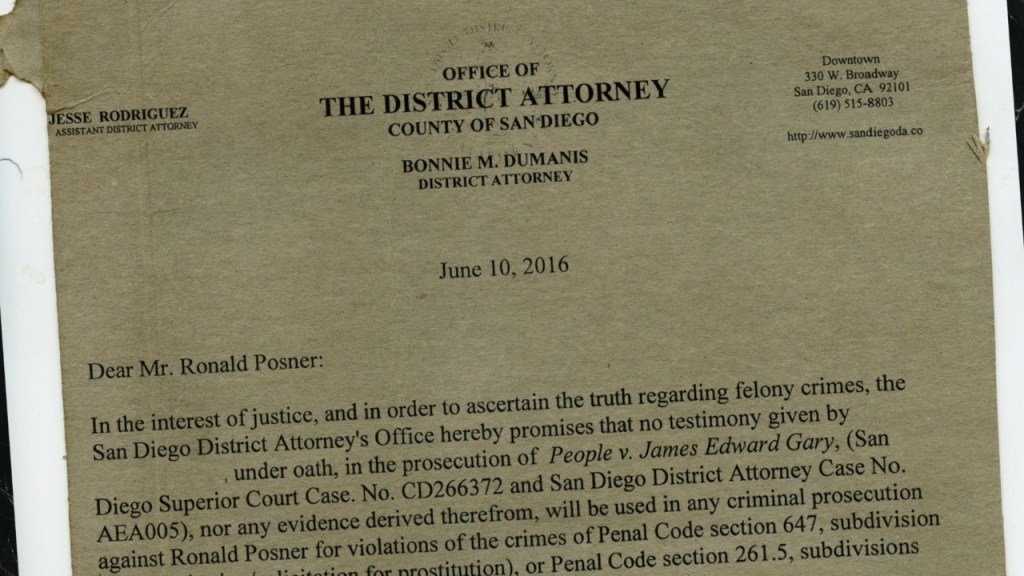
Current District Attorney Summer Stephan, who Rice reported to in 2016, said she wasn’t in the decision-making loop for this case. Stephan declined to speak about it on camera.
In a phone conversation with NBC 7, Stephan spoke in general terms about immunity deals. She explained that in order to charge a sex buyer with a felony, there must be evidence proving the buyer knew the victim was underage before having sex, a difficult burden of proof when a sex buyer says the victim claimed to be an adult.
In Posner’s case, he testified the girls told him they were 18 and 19 years old. And the DA’s office says without proof, Posner, at the most, would have been facing a misdemeanor charge.
Criminal jury instructions in California instruct juries to find a defendant accused of statutory rape of a minor “not guilty” if they find the defendant “reasonably and actually believed that the other person was age 18 or older.”
But according to Gary’s defense team, the District Attorney’s office said there had been no subsequent criminal investigation of Posner, therefore the evidence to prove or disprove whether he knew the girls’ ages was never obtained.
When asked by NBC 7 about a subsequent investigation into Posner, the DA’s office would neither confirm nor deny one took place.
In a previous interview for NBC 7’s STOLEN documentary series, Stephan said when it comes to sex buyers, there’s a hole in the state’s legal system.
“Our laws have become stronger when it comes to traffickers, there is real accountability there,” Stephan said. “But unfortunately the accountability, or the punishment for buyers, is almost non-existent.”
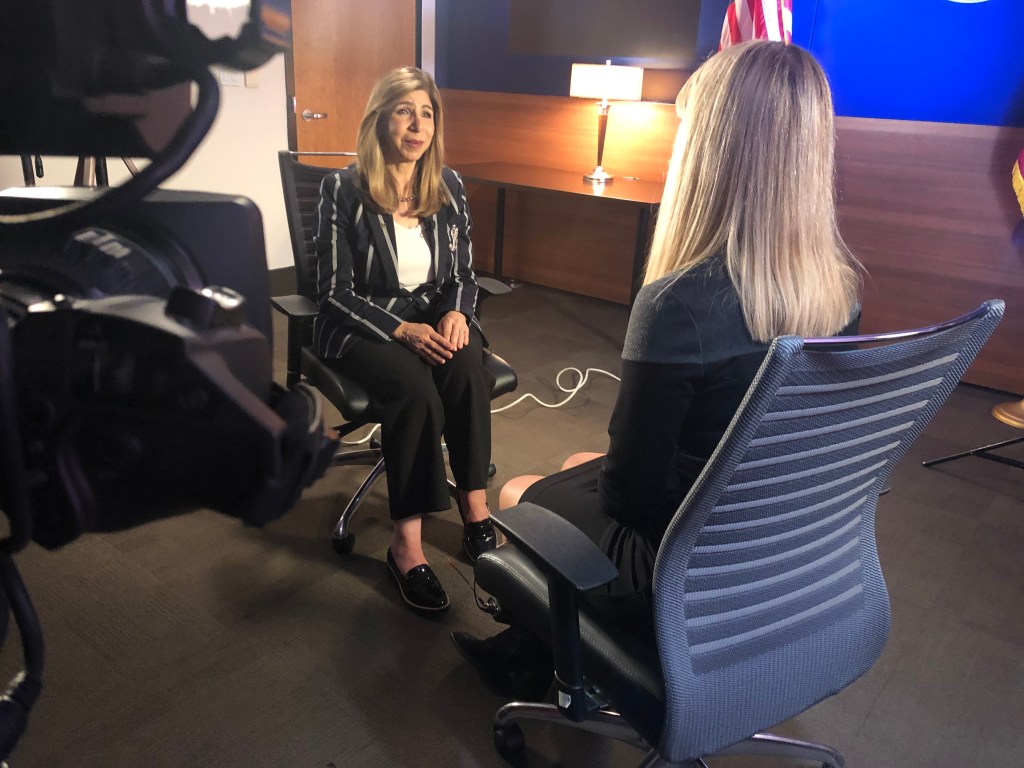
Prosecutors in Santa Clara, Sacramento, and San Bernardino agree.
“Historically, the state has undervalued the damage done by sex buyers,” said Sacramento County Assistant Chief Deputy DA Paul Durenberger.
In 2017, Stephan and California Assemblywoman Lorena Gonzalez introduced legislation that could have addressed this gap.
Assembly Bill 1708 would have increased penalties for sex buyers. In cases where a sex buyer knew or should have known that the person was a minor, under AB-1708, they could be fined anywhere between $1,000 to $10,000, and be forced to spend 72 hours in jail.
“I was shocked, although I guess I shouldn’t have been, with how hard it was to get this bill passed,” Gonzalez told NBC 7 by phone. “And I was more shocked when it got vetoed,”
Gonzalez believes the legislation was vetoed by then-Governor Jerry Brown as part of the state’s overall efforts to decriminalize certain kinds of felony crimes and decrease prison populations.
Gonzalez said she may re-introduce the legislation, but in the meantime, she and Stephan feel sex buyers aren’t facing real consequences for their actions.
“We're sending a message that this is really no big deal,” Stephan said.
POSNER'S LEGAL ENCOUNTERS
Though Posner faced no criminal charges in 2016, he does have other legal woes.
In September 2016, the IRS required him to provide testimony and documents "to determine the collectability of his income tax liabilities for the 2007 and 2008 tax years," according to a filing in federal court.
Court records confirm Posner failed to comply with the IRS summons and was arrested on April 11, 2018.
He was sent to jail, and initially produced some of the information requested by the IRS. But after he made bail, court records show Posner stopped responding and was a no-show for his scheduled hearings. In January 2019, a bench warrant was issued for his arrest.
The 16-year-old girl from the James Gary trial is also suing Posner in civil court, alleging rape, battery, and emotional distress.
In the lawsuit, the girl, identified only by her initials, alleges Posner’s sexual relationship with her lasted from August 2015, to July 2017, more than a year after Posner testified he had stopped seeing the teen.
The teen alleges she had sex with Posner “hundreds of times” during the two-year period.
In his interview with NBC 7, Posner said he knew nothing of the lawsuit, but still claimed that all the girl’s allegations “are made up.” He denounced the teen’s lawsuit as an “extortion attempt.” He also claims that shortly after Gary’s trial, he received a letter from one of the girl’s attorneys, threatening to “...expose him if he didn’t pay a large sum of money.”
“What do you call that?,” Posner asked NBC 7. “I call it extortion.”
Attorneys representing the teen at that time did not respond to NBC 7’s request for comment, and Posner did not produce a copy of the letter.
According to court documents, Posner never responded to the allegations in the lawsuit, and in October 2018, a judge ordered him to pay the teen and her attorney $2 million.
Posner said he wasn’t aware of the judgment, contrary to sworn court declarations by several local servers who say they have served Posner documents related to the lawsuit and default judgment on numerous occasions.
To date, Posner has not paid anything. With interest, court records filed in July 2020 by a new law firm representing the teen show the amount now owed by Posner has grown to $2.3 million.
On January 10, 2020, a superior court judge issued a bench warrant for Posner’s arrest tied to his lack of response to the civil lawsuit.
While there is no evidence of any further investigation into Posner, public records obtained by NBC 7 show the visit by the San Diego D.A. Investigators in April 2016 was not the first time law enforcement paid a visit to Ronald Posner’s condo.
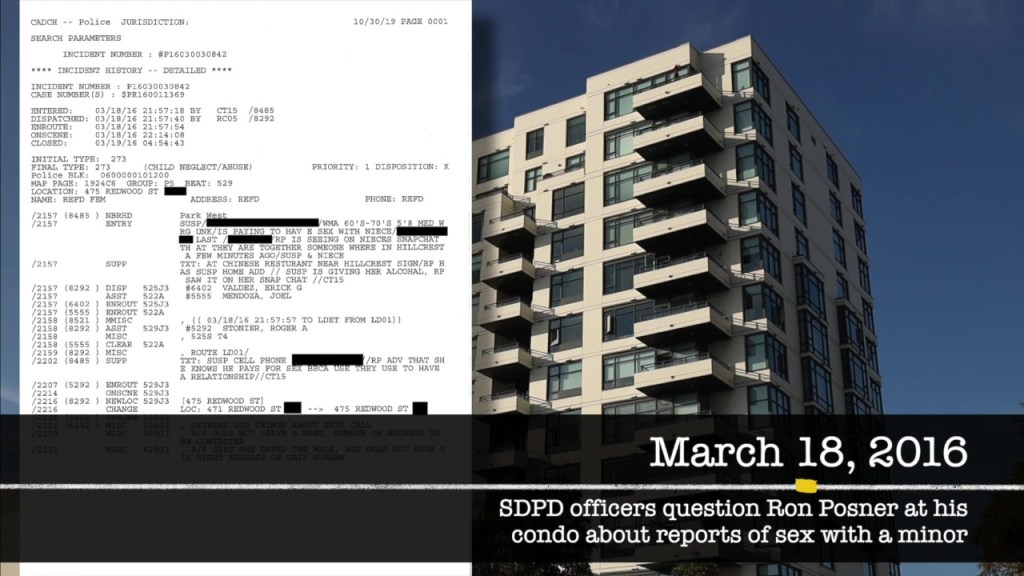
A San Diego Police Department report, obtained by NBC 7 through a public record request shows officers were dispatched to Posner’s condo on March 18, 2016, for a “suspected child abuse investigation.”
According to the report, a woman had called SDPD claiming Posner was paying her underage niece for sex. The woman said she had seen on the girl’s Snapchat account that Posner had taken the girl to a Chinese restaurant in Hillcrest and had given her alcohol.
Officers arrived at Posner’s condo but said there was no girl, and “no victim at this time,” but added Posner was “not being truthful with us.” The officers said they planned to notify the San Diego County Human Trafficking Task Force but it’s unclear if they followed through.
When asked by NBC 7 about San Diego Police coming to his door in 2016, Posner said it was nothing, and suggested it may have been a set-up.
“Someone called them but I don't know who. And sent them over there, but there was no girl and there was no one missing.”
“It wouldn't have taken a lot of investigation or police work to figure out there was a larger web of women that [Posner] was connected to,” says Patrick Dudley, Gary’s defense attorney. “Specifically his Facebook was just littered with women, young women who were clearly underage and just didn't sort of match his profile of who he was.”
NBC 7 sent messages to 34 young women listed as “friends” of Posner on his Facebook page. Eight women responded.
One woman said Posner was a “good friend,” and that she would never talk badly about him. Four women inquired about the story but declined to comment further when they found out more about the NBC 7 STOLEN investigation.
Another said she was 18 when Posner “messaged her on Facebook” offering to “travel together” and “take her shopping often.”
Two women said Posner was a “known trick” or sex buyer in their social circle and had a reputation for having relationships with young women and spending lots of money on them. One of those women said he had solicited her but she never agreed to have sex.
When asked about what the girls told NBC 7, Posner said it was all untrue.
“I wasn't out actively soliciting underage girls or any girls for that matter,” Posner said. “As I said, I was really the victim in all of this.”

